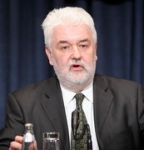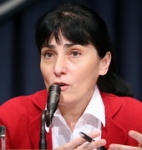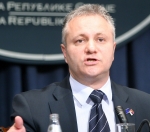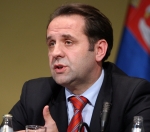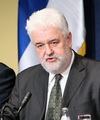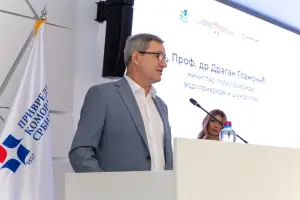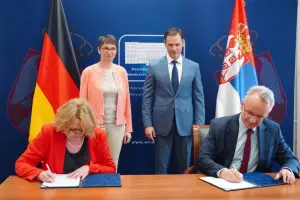Q:
A:
Government plan to save nearly RSD 100bn in budget
Belgrade,
7 April 2009
Serbian Prime Minister Mirko Cvetkovic stated today that the government has adopted a plan for economic stability which will reduce the expenses for public administration by RSD 100 billion, or nearly €1 billion.
Cvetkovic told a press conference that 85% of that sum will be generated by reducing expenses while 15% will come by increasing revenues, noting that this is the largest fiscal adjustment to Serbia’s public finances in the past two decades.
According to Cvetkovic, the main principles of the plan are unity, solidarity and continuity, while long-term goals are reductions in administrative costs and controls over the work of public companies.
The plan will also help those that are in greatest jeopardy, he said, noting that the savings will be carried out on all levels and will mean cheaper administration, economic growth, support for public works and investment in infrastructure.
According to Cvetkovic, the main principles of the plan are unity, solidarity and continuity, while long-term goals are reductions in administrative costs and controls over the work of public companies.
The plan will also help those that are in greatest jeopardy, he said, noting that the savings will be carried out on all levels and will mean cheaper administration, economic growth, support for public works and investment in infrastructure.
Minister of Finance Diana Dragutinovic said that all the sides eventually reached a compromise in order to help solve the problems and calm down Serbian citizens.
She explained that the plan envisages an increase in the excise duties on petrol and diesel by RSD 2 and RSD 4, the introduction of excise duty on mobile phones, increases in car, yacht and aircraft taxes, as well as property and income taxes.
The Minister noted that in that way the government will secure a RSD 16 billion income.
According to her the Ministries’ expenditures will go down by 26% or RSD 40 billion, adding that according to the plan the budget deficit for 2009 will be 3%.
Minister Dragutinovic pointed out that fiscal stabilisation is an unpopular measure as it implies a severe decrease in expenditures and joint efforts from the entire state administration.
Dragutinovic said that the set of economic measures is final and no further changes will be made to it, adding that it was presented to IMF representatives.
She said that after the set of measures is adopted by the government it will be presented to parliament, which should pass it by the beginning of May at the latest.
The Minister said that the revised budget for 2009 should be adopted by May 1, adding that all items on the budget should be finalised next week, after which it will forwarded to the Serbian Parliament.
She said that a special law will be passed along with the budget revision, according to which the salaries of public administration employees will be regulated.
The law is a temporary one and will be implemented over the next nine months, said the Minister, adding that the law envisages that the net salaries of state employees will be reduced, which will lead to savings of RSD 2 billion.
She explained that the plan envisages an increase in the excise duties on petrol and diesel by RSD 2 and RSD 4, the introduction of excise duty on mobile phones, increases in car, yacht and aircraft taxes, as well as property and income taxes.
The Minister noted that in that way the government will secure a RSD 16 billion income.
According to her the Ministries’ expenditures will go down by 26% or RSD 40 billion, adding that according to the plan the budget deficit for 2009 will be 3%.
Minister Dragutinovic pointed out that fiscal stabilisation is an unpopular measure as it implies a severe decrease in expenditures and joint efforts from the entire state administration.
Dragutinovic said that the set of economic measures is final and no further changes will be made to it, adding that it was presented to IMF representatives.
She said that after the set of measures is adopted by the government it will be presented to parliament, which should pass it by the beginning of May at the latest.
The Minister said that the revised budget for 2009 should be adopted by May 1, adding that all items on the budget should be finalised next week, after which it will forwarded to the Serbian Parliament.
She said that a special law will be passed along with the budget revision, according to which the salaries of public administration employees will be regulated.
The law is a temporary one and will be implemented over the next nine months, said the Minister, adding that the law envisages that the net salaries of state employees will be reduced, which will lead to savings of RSD 2 billion.
Serbian Deputy Prime Minister and Minister of Economy and Regional Development Mladjan Dinkic said that the law on state employees will be amended because expenditure cuts and reductions in the number of public administration employees at all levels are being planned.
Dinkic said that these measures will lead to a 15% reduction in budgetary expenses, adding that newly redundant employees will be given severance payments in accordance with the Labour Law.
The Deputy Prime Minister announced that the government will reconsider severance pay in local self-governments, as it used to be up to €10,000 per employee.
He said that more than €1 billion in international loans should be approved to Serbia for construction on the Corridor 10 highways by autumn.
Dinkic said that the World Bank board is expected to approve a loan of $388 million for construction on the southern section of Corridor 10 in May and the European Investment Bank (EIB) should approve €660 million for the purpose in June.
He said that the European Bank for Reconstruction and Development will make a decision concerning a loan of €150 million for construction on the southern section of Corridor 10 in July and Serbia has also received a donation of €100 million from the Hellenic Plan for this project.
Dinkic said that works will begin on the Horgos-Novi Sad highway in May because work on the tender is still going on.
We are also planning to reconstruct the Corridor 10 railway, he said, adding that part of the work will be financed from the budget while the major part of the financing will come from loans.
He said that an investment of €472 million in the Corridor 10 highways is planned for 2009 and €220 million will be invested in the modernisation of the railway.
Dinkic said that these measures will lead to a 15% reduction in budgetary expenses, adding that newly redundant employees will be given severance payments in accordance with the Labour Law.
The Deputy Prime Minister announced that the government will reconsider severance pay in local self-governments, as it used to be up to €10,000 per employee.
He said that more than €1 billion in international loans should be approved to Serbia for construction on the Corridor 10 highways by autumn.
Dinkic said that the World Bank board is expected to approve a loan of $388 million for construction on the southern section of Corridor 10 in May and the European Investment Bank (EIB) should approve €660 million for the purpose in June.
He said that the European Bank for Reconstruction and Development will make a decision concerning a loan of €150 million for construction on the southern section of Corridor 10 in July and Serbia has also received a donation of €100 million from the Hellenic Plan for this project.
Dinkic said that works will begin on the Horgos-Novi Sad highway in May because work on the tender is still going on.
We are also planning to reconstruct the Corridor 10 railway, he said, adding that part of the work will be financed from the budget while the major part of the financing will come from loans.
He said that an investment of €472 million in the Corridor 10 highways is planned for 2009 and €220 million will be invested in the modernisation of the railway.
Minister of Labour and Social Policy Rasim Ljajic stressed that the new package of measures will help distribute the burden of the crisis more evenly, announcing that the government is soon to adopt new measures for the most vulnerable citizens.
Ljajic said that the second package of measures, stipulating a decrease in state administration expenditures, has both political and economic dimensions.
He announced that the government will present its measures against the effects of the crisis on the upcoming international conference, taking place on April 24 in Belgrade, where a majority of the Labour Ministers from EU member states will participate.
Ljajic announced the setting up of a fund worth around RSD 3 billion for the most vulnerable groups of people.
The Minister recalled that the government’s first package of measures from January 2009 envisaged the subsidizing of loans for citizens and businesses.
Ljajic said that the second package of measures, stipulating a decrease in state administration expenditures, has both political and economic dimensions.
He announced that the government will present its measures against the effects of the crisis on the upcoming international conference, taking place on April 24 in Belgrade, where a majority of the Labour Ministers from EU member states will participate.
Ljajic announced the setting up of a fund worth around RSD 3 billion for the most vulnerable groups of people.
The Minister recalled that the government’s first package of measures from January 2009 envisaged the subsidizing of loans for citizens and businesses.

